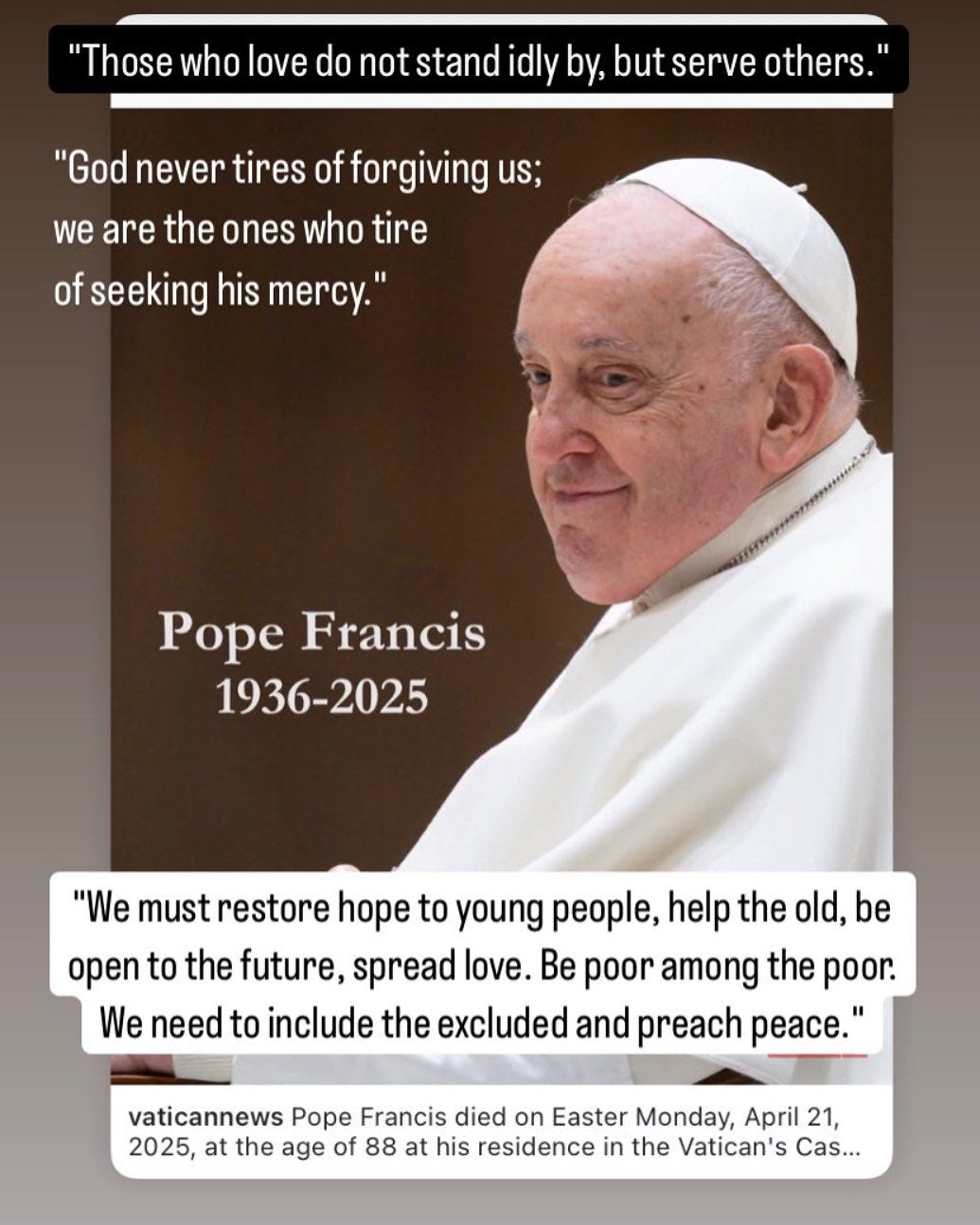"God never tires of forgiving us...." remembering Pope Francis
a pastoral reflection on Pope Francis, his kindred spirit with the YMCA, and his ecumenical work for all to know the merciful forgiveness of God in Christ Jesus, especially amongst the marginalized...
I was sad to hear of the death of Pope Francis on early Easter Monday morning. Not only are there over a billion Catholic Christians mourning around the world, another billion Protestant, Orthodox, Anglican and Pentecostal Christians are also grieving; together, though, there is much gratitude for his life and leadership.
His given name is Jorge, and like the George who founded the YMCA in 1844, they both at age 22 had a kind of conversion and call to serve in Christian ministry. Jorge became a Jesuit priest in Argentina, George became a successful businessman in England; they both had a profound desire to see souls saved by Jesus Christ, that they might be transformed in spirit, mind and body to love with mercy in the world.
As a bishop in Argentina Jorge became know as the “slum bishop” for his ministry in the impoverished favelas of Buenos Aires; as a founder of the Young Men’s Christian Association George and his eleven business friends worked diligently to minister to the young men being dehumanized in the factories of Industrial London.
The YMCA was founded by Protestant Christians who sought to build bridges between denominations who were suspect of each other or entrenched in different social classes; Jorge was a Jesuit, the Catholic Society of Jesus known for their commitment to going to the ends of the earth to evangelize, educate, innovate, and liberate.
Up into the 1960’s there was not much friendly relations in the United States or around the world between Protestant and Catholic Christians, for many political, social, cultural, economic, geographic, and linguistic reasons. Sad, but not something to sneer at, as there will always be divisions between humans, especially when it comes to something so precious and important as religion.
But there were many within the YMCA and the Catholic Church who wanted to be friends, especially as they played basketball together, learned to swim, and served unruly urban youth that needed mentors and inspiring programs.
And now we sometimes take it for granted that Protestant, Catholic, Orthodox, Anglican and Pentecostal Christian families can be members at the Y participating in our mission. This kind of ecumenical Christianity, built on friendship, hospitality, open-hearts, and a generous spirit also is why we wanted Jews and Muslims to be active members in our Y, and eventually people from any faith background, or none.
It’s extraordinary, if you reflect on it, on the grace and joy built into the heart of the Y’s desire to be for all, it’s not just an ideal way of life, but a source of Christian vitality that has animated the ministry of George Williams and Pope Francis. And us.
As a pastor for thirty years in Fort Wayne, mostly with Anchor Community Church and the YMCA, I’ve come to strongly believe vital spirituality and vibrant congregations are born of loving proximity and real solidarity with the marginalized.
Why? The need to trust God, the shared bonds of suffering, the simplicity of friendship, and the inherent reliance on one another all have the marks of Christ’s presence and ministry. That’s the heartbeat of our call…
Jesus, whom we worship and strive to obe,y was eventually homeless, born in scandal, exiled to Egypt, a refugee in Africa, a political threat, and accused of being a glutton and drunkard from all the feasts he got invited to in seedy neighborhoods by women and men of ill repute. Will we go where he was sent?
For the past dozen years, the humble, complicated, controversial, earnest, compassionate, courageous, welcoming ministry of Pope Francis has been an ongoing inspiration to me as a pastoral leader. Whatever power might be available to me, whatever privileges, whatever gifts, how are they an instrument for Christ’s peace, justice and mercy in these tumultuous days?
Here are a few more quotes of Pope Francis on the Marginalized:
“This is important: to get to know people, listen, expand the circle of ideas. The world is crisscrossed by roads that come closer together and move apart, but the important thing is that they lead towards the Good.”
“Openness to God makes us open towards the marginalized of this world, and gives us the courage to leave the confines of our own security and comfort to become bruised, hurting and dirty as we joyfully approach the suffering other in a spirit of solidarity.”
“Even in the developed world, the effects of unjust structures and actions are all too apparent. Our efforts must aim at restoring hope, righting wrongs, maintaining commitments, and thus promoting the well-being of individuals and of peoples.”





